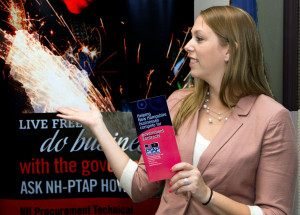We’ve covered some of the higher-level facets of federal government contracting in previous “5 Questions” interview pieces, and this time, we decided to dig a little deeper into the space – looking at state and local opportunities, and what it’s like for a company to actually work with a procurement service.
To guide us in this area, we interviewed Amanda Duquette, procurement specialist with the New Hampshire Procurement Technical Assistance Program (NH-PTAP). Her day-to-day work includes one-on-one counseling with New Hampshire businesses selling their products or services, either directly to the local, state, and federal government or indirectly through subcontracting, as well as performing marketing research and creating strategic plans for companies to get the training and technical assistance they need to come up to speed for government contracting opportunities.
1. You’ve been with PTAP since 2007 and have worked with many, many businesses. How vital would you say PTAP’s services are to the overall success of those companies?

Amanda Duquette
Most of the clients that we help come to us because they aren’t sure how to best pursue government contracts. There are many registrations and processes that need to be completed before a company can be awarded a government contract. We help companies navigate through the red tape and we basically walk them through the entire process. There are many rules and regulations that go along with contracting with the government – and they are constantly changing. I think PTAP’s services are vital to companies who want to successfully work for the government.
2. What kinds of assistance are requested most often by New Hampshire businesses?
Many of our clients are new to the government contracting arena. They are looking for assistance with government registrations and how to find government contracts that are a good fit for their company. They want us to teach them how to set their business up to work for the government and then how to find and pursue government work.
3. Much of the PTAP talk is about federal contracts, but you help with state and local contracts, too. Can you give us a sense of the variety of products and services needed at state and local levels?
There is a vast variety of products and services that are needed at the state and local level. There is usually a need for janitorial services, landscaping/snow plowing, construction/renovation work and automotive equipment. We also see needs for medical and professional services, laboratory equipment and hardware. Our Bidmatch service helps our clients get easy access to bidding opportunities that are found on the state and individual city and town websites, or published in the newspapers.
4. What kind of market research will you perform for clients interested in exploring contracting opportunities?
PTAP counselors do a lot of market research for our clients. We often have clients who want to know if the government is buying their products or services. We take our clients on virtual tours to show them what agencies are buying their products or services. We can show them who their competitors are and what they are selling to the government and we can also show them competitor’s prices and sales amounts. We also teach our clients how to search for government contracts. If our client isn’t ready for direct government contracts, we show them how to find subcontracting opportunities.
5. Sometimes your clients aren’t quite qualified or otherwise capable of contracting with the government. What does PTAP do to help train or otherwise help these companies get to the point of being a suitable contractor?
You are right, not every company that comes to us is ready for government contracting. When we first speak with a new client, we assess his/her company – taking into consideration, its products/services, time in business, past performance and commercial market. We often recommend that companies that are not ready for direct government work reach out to prime contractors, to become a subcontractor for a piece of the project or work. This helps them get their feet wet with government work and helps them understand what it takes to complete a government contract. Also, when a company is a new start-up or not ready for our services, we usually refer them to our partners at the Small Business Development Center (SBDC) and/or SCORE.











![GovernmentContracting logo_rgb[1]](https://blog.nheconomy.com/wp-content/uploads/2016/01/GovernmentContracting-logo_rgb1-300x120.jpg)
